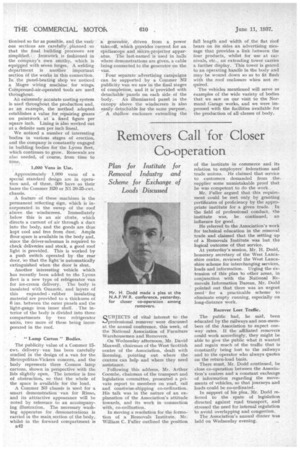Removers Call for Closer Co-operation
Page 58

If you've noticed an error in this article please click here to report it so we can fix it.
SU"ECTS of vital interest to the professional remover were discussed at the annual conference, this week, of the National Association of Furniture Warehousemen and Removers.
On Wednesday afternoon, Mr. David Maxwell, chairman of the West Scottish centre of the Association, dealt with licensing, pointing out where the centres can help and where they need assistance, Following this address, Mr. Arthur Coombe, chairman of the transport and legislation committee, presented a private report to members on road, rail and coastwise-shipping co-ordination. His talk was in the nature of an explanation of the Association's attitude towards, and its work in connection with, co-ordination.
In moving a resolution for the formation of a Removals Institute, Mr. William C. Fuller outlined the position of the institute in commerce and' its relatien to employers' federations and trade unions.. He claimed that service to customers demanded from the. supplier some unmistakable proof that he was competent to do the work.
Mr. Fuller argued that this requirement could be met only by granting pertificates of proficiency by the appropriate institute for a given trade, In the field of professional conduct, the institute was, he continued, • an influence for good.
He referred to the Association's work for technical education in the removal trade and claimed that the, setting up of a Removals Institute was but the logical outcome of that service.
At yesterday's session, Mr. H. Dodd, honorary secretary of the West Lancashire centre, reviewed the West Lancashire scheme for interchanging services, loads and information. Urging the extension of this plan to other areas, in conjunction with the National Removals Information Bureau, Mr. Dodd pointed out that there was an urgent need for a practicable scheme to eliminate empty running, especially on long-distance work.
Recover Lost Traffic.
The public had, he said, been educated by the railways and non-members of the Association to expect oneway rates. If the affiliated removers could work accordingly, they might be able to give the public what it wasted and regain much of the traffic that is constantly being -lost to the railways and to the operator who always quotes on the return-load basis.
There must, Mr. Dodd continued, be close co-operation between the Association's centres and a constant exchange of information regarding the movements of vehicles, so that journeys and loads could be co-ordinated.
In support of his plea, Mr. Dodd referred to the spate of legislation directed against road transport, and stressed the need for internal 'regulation to avoid overlapping and congestion.
The Association's annual dinner ivas held on Wednesday evening.






























































































